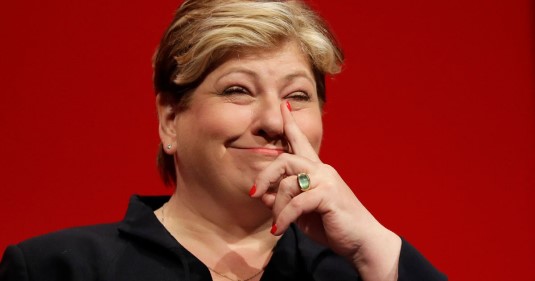
Falling short of the required CLP nominations threshold by two, she took to Twitter to thank her supporters, her team, and made the standard warm unity noises. The only clue it gives for her motivations is a desire to "widen the debate." But widen it to what purpose exactly? Back in 2010 and 2015 there was a clear rationale in this direction for letting Diane Abbott and Jeremy Corbyn onto the ballot paper. In 2019, you could make a similar argument for accepting Ian Murray onto the ballot paper, despite the craven, obsolete politics. The "debate" isn't a fun exercise in interesting discussions but about the vision and strategy required to take Labour back into government. What did Emily bring?
According to her website, she's been a campaigner and an effective performer in the Commons, which meant she was the right sort of person to lead Labour's comeback. This is certainly true - of the field she was by far the most experienced parliamentarian. And she is good at the despatch box, if Westminster theatre is your thing. Yet none of this tells us where she stood. Looking at her answers to questions, we get bits and bobs on campaign technology, on anti-semitism, on experiences and resources, and the most perfunctory of analyses on why Labour lost the general election (it was because we offered too many policies). That answer might suit the dwindling Progress groupies, but kinda overlooks the main reasons. Perhaps there was an element of avoiding a mea culpa here as, during the election campaign and long before, she was quite happy to carry on making the case for a second referendum and is partly responsible for the switch Boris Johnson exploited with alacrity.
On the one occasion Emily did venture into offering a political position during this contest, it was a disaster. Speaking at the Bristol hustings earlier this month, she was all for seizing empty properties from landlords to help resolve the housing crisis. Good stuff. But alongside this she has her frankly horrible social housing scheme whereby young people wanting a council property would be put into a lottery to get one, but then be kicked out when they reached the age of 30. "More radical than Jeremy Corbyn", indeed.
When it comes down to it, the lack of a pitch - which the other three candidates have - failed completely to differentiate her from the crowd. Relying just on character or the opinion that "I'd be rather good at being leader" isn't going to impress anyone thinking about how Labour can retool and win back lost ground. Sad to say, as much as a laugh Emily is, conveying the message that the main thing wrong with Corbynism was its being led by Jeremy Corbyn as opposed to Emily Thornberry was a hiding to nothing. For this reason, there was nothing to gain from "widening the debate" and allowing her the opportunity to rob Liz Kendall of her record for the lowest vote in a Labour leadership election.
Has her leadership bid improved her chances for a big job in the next shadow cabinet? Very low. If Keir gets it, then I can see her shuffled into a less showy, more minor role. He will want to appoint some MPs keen on returning to front line action after their self-imposed exile toward the rear of the opposition benches. And, unfortunately for her, Emily proved herself to be a loose cannon - something I can't imagine the frontrunner wanting to deal with as he's busy establishing himself in the public eye. As for Rebecca Long-Bailey, despite the threats by the usual moaners, she is likely to have a greater pool of people to pick from than Jeremy did as some, especially on the soft left (and no doubt encouraged by her appointing Lisa to something). Again, the indiscipline and hard remainism counts against Emily here and therefore I'd expect RLB won't be too keen either. You see, here is her big mistake. If the motive for making a leadership bid was the acquisition of a new, or maintenance of her senior position afterwards, you've got to show you bring something to the table. With her baggage, and her poor showing at the nomination stage all Emily has accomplished is a demonstration of her dispensability. No following, no weight, sadly she might just have done the next stage of her career in.
Image Credit
1 comment:
A bit harsh. Something ET has shown she has is the personal qualities to be a frontline politician, in particular the composure to deal with hostile questions and the aggression to turn them back on the questioner. (Nandy and RLB lack the composure but do have the aggression; Starmer doesn't even have that.) But I guess leading on those qualities marks her out for a less 'political' role - Deputy Leader, say - and she doesn't seem to have the discipline for that. Next Speaker but one?
Post a Comment